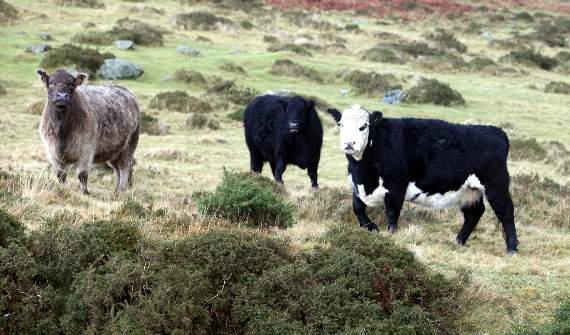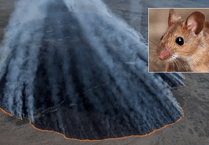THE weather may be changeable but Dartmoor is busy with holiday folk, most of which are welcome.
However, some visitors are frustrating for us farmers. Not being used to driving in the narrow lanes, you can actually see the fear in their faces if they have to reverse and sometimes, they are totally incapable of reversing if towing a caravan. I suppose I would be the same if I had to whizz around London with completely different driving conditions.
On one occasion this year, when I was herding some cattle from one farm to another on the open moor and had to travel along a stretch of road, I was angrily told by a holidaymaker ‘to keep my cows under control’ as they filed down the road past his car merrily heading for better pasture.
I felt I just had to stop and educate the visitor on dos and don’ts of travelling across open moorland, but I don’t think he really understood my verbal expression — some you win, some you don’t!
The frustrating weather conditions in July and August meant that farmers have not been able to plan ahead with hay and silage harvesting. We were lucky in that we caught a few days to harvest our silage crop and then snatched the few days when the heatwave struck Devon, but it meant very long working hours to get the harvest in.
Thankfully we had no mechanical breakdowns this year and I must say we had excellent silage contractors, B&B.
They worked until 11.30pm and their good time-keeping and professionalism got our crop all finished and in the silage pit roughly sheeted down just in time before the rain started, which left us with a good crop in difficult conditions.
Our round bale silage was wrapped up in a similar time, with the hay crop being really good though later than planned. This was harvested in the heat wave that we had in late July. No time was wasted thanks to excellent work by our baling and wrapping contractor Dan Luxton.
The cost of specialist harvesting machinery makes it unviable for us to own, other than a mower and a hay turner and the tractors to operate them. It means we are reliant on agricultural contractors who work long hours during short periods, with a huge amount of money tied up in machinery.
The machinery seems to get larger each year, and living on a traditional hill farm we now cannot get the large harvesters over a local bridge leading to the main farm entrance; we have had to make another large gateway leading from a ‘B’ road into the fields.
The contractor’s machinery moving around the fields on the farm has meant that the gateways have all had to be enlarged. Someone once said to me ‘no matter how wide your gateways are, they won’t be big enough’ – it was a wise statement!
Enough of harvesting and onto livestock, with the annual agriculture shows which are as popular as ever. They are the showcase for farming and a time to catch up with old friends and discuss how agriculture is doing in general.
At the same time we keep the sheep calendar moving on, with weaning lambs and the sheep sales starting to get into full swing. Decisions need to be made about whether to keep ewes for breeding on the hills or whether to sell them to farmers in kinder climates in the lowland areas. The breeding ram sales start in September for the hill breeds.
Our breeding bulls are all working hard keeping their ladies happy and we look forward to many babies next spring. We work with three breeds of stock bulls with two traditional breeds, Halloway and Hereford and one continental breed, Blonde d’Aquitaine. We have had to replace one from each breed this year, which makes it an expensive year, but your bull is considered to be half the bloodlines of your herd so you must be choosy and find a good match for their ladies.
We won’t really know until next spring when their offspring are born, but then the new bulls will be judged alongside the old bulls already working on the farm. We also put some selected heifers to artificial insemination with chosen sex semen to breed better quality cows from Shorthorn and Hereford bulls, which is a very interesting project we have done on the farm for the last few years.
Okehampton Show is held in August each year and unlike any other local shows we have special show classes there for Galloways. The cattle do not have to be halter trained so when we get them ready for the show it’s a bit of a rodeo to handle them and give them their shampoo and set!
The Galloway cow is a very important base animal to graze the high moor. It is able to forage on the rough grazing and when crossed with a Shorthorn, Hereford, or South Devon bull it produces a larger suckler cow to then cross with a continental bull for a larger carcass to produce prime beef.
The pedigree Galloway cattle sale is quite special. The main livestock market and sales for Galloways is in Dumfries and the breed society headquarters is at Castle Douglas.
In the last few years the South West Galloway farmers have started a regional sale at our local livestock market in Tavistock every July. We hold a special sale of pedigree and crossbreed Galloways and I was particularly pleased this year the sale went well and our stock bull made a record price at this sale.
We had to sell him because some of his lovely daughters needed a new husband so he had to be sold to work on another farm and I know he will leave some good young stock. He has done very well for us and he was a real gentleman. He was very good tempered to handle, which is a real must in the make-up of a bull. He is particularly special as he was locally bred by another Galloway farmer Michael Reddaway from Sticklepath. Who needs to travel to Scotland, we can do it all ourselves? This leads me on to Brexit.
When I wrote my last article in April, our referendum hadn’t happened but now we have Brexit. I personally feel it will be an opportunity to take the chains and restraints off British businesses. That very much includes the farming sector.
We must not forget that Europe needs us as much as we need Europe. The old saying ‘no pain no gain’ could happen, but the farming communities now want our government to listen to the grassroot people through our lobbying associations like the County Land and Business Association (CLA), National Farmers’ Union (NFU) and the Common Land organisations to negotiate a satisfactory outcome for everyone in the food chain, consumers and producers alike.
Government bodies connected to farming need a good shake up and I have written in my last few articles about payments due to upland farmers being delayed. Well they have paid part of the money, but still haven’t been completed and we know not when they will be.
Payment statements have not been produced by the Rural Payments’ Agency (RPA) although they should be received by mid August. Miscalculated back payments going back six years made to upland farmers, still haven’t been paid even though 12 months ago they we were promised payment by the end of 2015.
So where do we go from here? Meetings are due to take place with the head of the RPA in a couple of weeks and we have to start all over again. We have new DEFRA ministers due to the cabinet reshuffle just when we were getting use to Liz Truss and she and her advisers were beginning to understand the moorland farming problems. Now it’s all change again so I hope Andrea Leadsom has a good ear as there is certainly a lot of information going her way.





Comments
This article has no comments yet. Be the first to leave a comment.